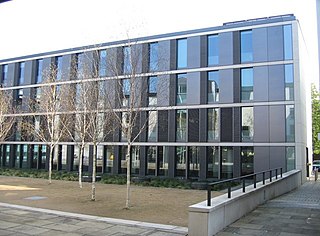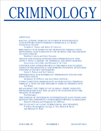In ordinary language, a crime is an unlawful act punishable by a state or other authority. The term crime does not, in modern criminal law, have any simple and universally accepted definition, though statutory definitions have been provided for certain purposes. The most popular view is that crime is a category created by law; in other words, something is a crime if declared as such by the relevant and applicable law. One proposed definition is that a crime or offence is an act harmful not only to some individual but also to a community, society, or the state. Such acts are forbidden and punishable by law.

Criminal justice is the delivery of justice to those who have been accused of committing crimes. The criminal justice system is a series of government agencies and institutions. Goals include the rehabilitation of offenders, preventing other crimes, and moral support for victims. The primary institutions of the criminal justice system are the police, prosecution and defense lawyers, the courts and the prisons system.

Penology is a sub-component of criminology that deals with the philosophy and practice of various societies in their attempts to repress criminal activities, and satisfy public opinion via an appropriate treatment regime for persons convicted of criminal offences.

Cybercrime is a type of crime involving a computer or a computer network. The computer may have been used in committing the crime, or it may be the target. Cybercrime may harm someone's security or finances.
The National Criminal Intelligence Service (NCIS) was a United Kingdom policing agency. Following the Police and Criminal Justice Act 2001, NCIS returned to direct funding by the Home Office in 2002 and was a non-departmental public body. On 1 April 2006 it was merged into the newly created Serious Organised Crime Agency.
Articles related to criminology and law enforcement.

The Police Staff College, Bramshill, Bramshill House, Bramshill, Hampshire, England, was until 2015 the principal police staff training establishment in England and Wales.

Integrative criminology reacts against single theory or methodology approaches, and adopts an interdisciplinary paradigm for the study of criminology and penology. Integration is not new. It informed the groundbreaking work of Merton (1938), Sutherland (1947), and Cohen (1955), but it has become a more positive school over the last twenty years.

The Institute of Criminology is the criminological research institute within the Faculty of Law at the University of Cambridge. The institute is one of the oldest criminological research institutes in Europe, and has exerted a strong influence on the development of criminology. Its multidisciplinary teaching and research staff are recruited from the disciplines of law, psychiatry, psychology, and sociology. It is located on the Sidgwick Site in the west of Cambridge, England. The Institute of Criminology building was designed by Allies and Morrison. The institute is also home to the Radzinowicz Library, which houses the most comprehensive criminology collection in the United Kingdom. The institute has approximately 50 PhD students, 30-40 M.Phil. students, and 200 M.St students. The institute also offers courses to Cambridge undergraduates, particularly in law, but also in human social and political sciences and in psychology and behavioural sciences.
Jonathan Simon is an American academic, the Lance Robbins Professor of Criminal Justice Law, and the former Associate Dean of the Jurisprudence and Social Policy Program at the UC Berkeley School of Law. Simon’s scholarship concerns the role of crime and criminal justice in governing contemporary societies, risk and the law, and the history of the interdisciplinary study of law. His other interests include criminology; penology; sociology; insurance models of governing risk; governance; the origins and consequences of, and solutions to, the California prison "crisis"; parole; prisons; capital punishment; immigration detention; and the warehousing of incarcerated people.

Johan Thorsten Sellin was a Swedish American sociologist at the University of Pennsylvania, a penologist and one of the pioneers of scientific criminology.
James Sheptycki is a Professor of Criminology at York University, Toronto, Canada.

The criminal justice system of the Netherlands is the system of practices and institutions of the Netherlands directed at upholding social control, deterring and mitigating crime, and sanctioning those who violate laws with criminal penalties and rehabilitation efforts. The Netherlands' criminal code is based on the Napoleonic Code, imposed during the time of the French Empire. The Dutch largely kept the Napoleonic Code after their independence, but tempered it with a significantly more rehabilitative penological focus.
Sir Anthony Edward Bottoms FBA is a British criminologist. He is life fellow at Fitzwilliam College, Cambridge, having previously been a Wolfson Professor of Criminology at the Institute of Criminology in the Faculty of Law at the University of Cambridge from 1984 to 2006 and until December 2007 a professor of criminology jointly at the universities of Cambridge and Sheffield.

Criminology is the interdisciplinary study of crime and deviant behaviour. Criminology is a multidisciplinary field in both the behavioural and social sciences, which draws primarily upon the research of sociologists, political scientists, economists, legal sociologists, psychologists, philosophers, psychiatrists, social workers, biologists, social anthropologists, scholars of law and jurisprudence, as well as the processes that define administration of justice and the criminal justice system.

Criminology is a quarterly peer-reviewed academic journal published by Wiley-Blackwell on behalf of the American Society of Criminology. The editors-in-chief are Volkan Topalli and Thomas Loughran. The journal covers research in criminology, penology, cybercrime, deviance and criminal justice.

Jeffrey Ian Ross is a scholar, professor, and criminologist specializing in the fields of policing, corrections, political crime, violence, street culture, graffiti and street art, and crime and justice in American Indian communities. Since 1998 Ross has been a professor at the University of Baltimore. He is a former co-chair and chair of the Division of Critical Criminology and Social Justice of the American Society of Criminology. Ross is an author, co-author, editor, and co-editor of numerous books.

Karuppannan Jaishankar is the Founder and Principal Director and Professor of Criminology & Justice Sciences at the International Institute of Justice & Police Sciences Bengaluru, Karnataka, India.
Lesley McAra is Chair of Penology at the University of Edinburgh She is a fellow of the Royal Society of Edinburgh and was appointed a CBE in the New Year's Honours List 2018, for services to Criminology.
Roderic Broadhurst is a criminal justice practitioner, academic, and author. He is an Emeritus Professor at the School of Regulation and Global Governance (RegNet) and Fellow of the Research School of Asian and the Pacific at the Australian National University (ANU).









